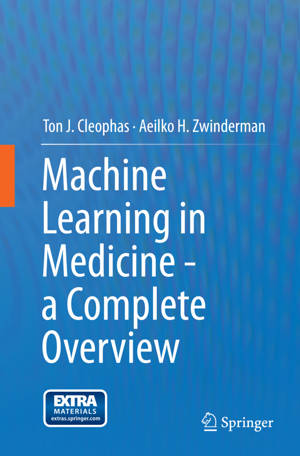
- Afhalen na 1 uur in een winkel met voorraad
- Gratis thuislevering in België vanaf € 30
- Ruim aanbod met 7 miljoen producten
- Afhalen na 1 uur in een winkel met voorraad
- Gratis thuislevering in België vanaf € 30
- Ruim aanbod met 7 miljoen producten
Machine Learning in Medicine - A Complete Overview
Ton J Cleophas, Aeilko H ZwindermanOmschrijving
The current book is the first publication of a complete overview of machine learning methodologies for the medical and health sector. It was written as a training companion and as a must-read, not only for physicians and students, but also for any one involved in the process and progress of health and health care. In eighty chapters eighty different machine learning methodologies are reviewed, in combination with data examples for self-assessment. Each chapter can be studied without the need to consult other chapters.
The amount of data stored in the world's databases doubles every 20 months, and clinicians, familiar with traditional statistical methods, are at a loss to analyze them. Traditional methods have, indeed, difficulty to identify outliers in large datasets, and to find patterns in big data and data with multiple exposure / outcome variables. In addition, analysis-rules for surveys and questionnaires, which are currently common methods of data collection, are, essentially, missing. Fortunately, the new discipline, machine learning, is able to cover all of these limitations.
So far medical professionals have been rather reluctant to use machine learning. Also, in the field of diagnosis making, few doctors may want a computer checking them, are interested in collaboration with a computer or with computer engineers. Adequate health and health care will, however, soon be impossible without proper data supervision from modern machine learning methodologies like cluster models, neural networks and other data mining methodologies.
Each chapter starts with purposes and scientific questions. Then, step-by-step analyses, using data examples, are given. Finally, a paragraph with conclusion, and references to the corresponding sites of three introductory textbooks, previously written by the same authors, is given.
Specificaties
Betrokkenen
- Auteur(s):
- Uitgeverij:
Inhoud
- Aantal bladzijden:
- 516
- Taal:
- Engels
Eigenschappen
- Productcode (EAN):
- 9783319386386
- Verschijningsdatum:
- 9/10/2016
- Uitvoering:
- Paperback
- Formaat:
- Trade paperback (VS)
- Afmetingen:
- 156 mm x 234 mm
- Gewicht:
- 748 g

Alleen bij Standaard Boekhandel
Beoordelingen
We publiceren alleen reviews die voldoen aan de voorwaarden voor reviews. Bekijk onze voorwaarden voor reviews.








